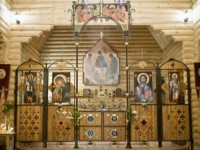 What does the name Christ mean?
What does the name Christ mean?
One day the Lord asked his disciples, «who do people think I am, the Son of Man?». The disciples answered: «Some took John the Baptist (this was the most popular «religious figure», then everyone heard about him, but not everyone saw him – because the media did not exist then), others took Jesus for the prophet Elijah (according to the Scriptures, he did not die, but was taken to heaven), and others took him for Jeremiah (his fate was typical for a prophet), or for someone else from the prophets. And then the Lord turned the question to the teachers themselves: «who do you think I Am?». And Peter (he was the eldest), on behalf of all the disciples, utters the confession on which the entire Church is built: «You are the Christ, the Son of the Living God!»
And the question is, «who is Jesus of Nazareth?» and now it is addressed to every person and, therefore, to all mankind. And we, together with the apostles, can say that Jesus is the Son of God, this is the Christ! But what did the word «Christ» mean to the apostles two millennia ago, and what does it mean to us now? Even before our era-before the birth of Christ, the books of Holy Scripture were translated from the Hebrew language in which they were written, into Greek, the most common language in the «inhabited world». And the Greek word «Christ» is a translation of the Hebrew word «meshiach» (hence the name of Jesus is «Messiah») which means «anointed». In the era of the Old Testament «Christ the anointed one,» called the high priest, king, prophet sometimes – in a sign of visible dedication to the service were anointed with the oil – olive oil mixed with perfume, but the anointing could not be, it only symbolized the Holy spirit anointing from above. It is interesting that the title «Christ» was applied even to the pagan king Cyrus II, as an instrument of divine Providence. So, in the religious representations of the Old Testament times, «Christ» is God’s messenger, the king of the last times. Quote from Averintsev: ….
And first of all, «Christ» in the Scripture is called The only One who will become the king of the people and lead them to God. The one whom man expected as a deliverer and Saviour. The one that a prophet, a king, and a priest were supposed to represent in their service. He Who addresses us with His word and teaching in the gospel, Who is the high Priest of the Church, and Who is the King of the universe. The one whom the future apostles recognized in Jesus when they met him. The first disciples say of Jesus: «We have found the Messiah, which means Christ» (Jn.1.41) Philip to Nathanael: «We have found the one of whom Moses wrote in the law and the prophets…» (Jn 1.45), and Nathanael, having believed, says to Jesus: «Rabbi (Teacher)! You Are The Son Of God, You Are The King Of Israel» (Jn 1.45).
But no one then-not the people, not even the disciples, did not imagine that Christ is not the king of the people alone, but the King of the whole world – the King of the universe! And He came into the world not to receive Royal honors, but to ascend to the Cross, to overcome death by the Resurrection, and to be a king not only of the people, but Of the Universe, the Lord of » both the living and the dead»
Scholastic (school) theology refers to the last three years of Christ the Saviour’s earthly life, during which he preached, taught, performed miracles, died and rose again – as an earthly or public service. This is based on the words of the Lord himself who said that He did not come to be served, but to serve Himself. And yet, school theology speaks of the threefold Ministry of Christ as King, high Priest, and Prophet, and this is justified by the Scripture on which all theology is based. What does the Scripture tell us about Christ in this context?
«A prophet from among you, from your brothers, the Lord your God will raise up for you-listen to Him» (Deut.18.15). It was these words of Moses, addressed to his people, that were remembered by those who, after one of the miracles performed by the Lord, exclaimed: «This is truly The prophet who must come into the world» (Jn. 6: 14; Deut. 18:15). Prophecy is always connected with the knowledge of God, with the proclamation of His will, but no one knows God the Father perfectly, except His only begotten Son and the one to whom he wants to reveal. No one saw God the Father except His Son, and the prophets were able to see only a semblance of the Glory of God. Thus the fullness of God’s knowledge is revealed to us by Jesus Christ. And «God, who in many ways and many times spoke of old as the Father in the prophets, in these last days spoke to us in the Son» (Heb.1.12). And if the meaning of the Old Testament prophecies consisted, first of all, in the promise of the coming of Christ into the world, then it is clear that these prophecies disappear with His arrival.
With the coming of Christ, not only the Old Testament prophecy was abolished, but also the Old Testament priesthood, the essence of which consisted in offering sacrifices – those gifts that were offered to God in the Jerusalem temple. It can be assumed that if it were not for the fall, then the whole life of man and all his love could become a response to His gift of love, by which God brings the world and man into being. But even in the world distorted by sin, man retained the need to offer both thanksgiving and worship to God. And in the age of the Old Testament, the sacrifice was offered both as a sign of thanksgiving and as a sign of repentance – a sin offering. The very first sin committed by the progenitors-Adam and Eve-brought mortality to the entire human race, and in the realization that «sin made begets death» (James. 1:15) the sinner sacrificed a lamb – a lamb that was to die in the place of a man. But «it is not possible that the blood of bulls and goats should destroy sin – the Apostle will write about it – all these were images for us» (Heb. 10:14). That is all the Old Testament sacrifices for us are images of one single Sacrifice of Christ the Saviour who took upon Himself the sins of the whole world and died for all and Whom the Scripture calls the lamb.
So, if in the Old Testament a man offered a sacrifice to God, then in establishing the New Testament, God Himself, who has become a Man, offers Himself as a sacrifice. Once upon a time, «the father of all believers» Abraham (he in the Scripture is a model of trust in God and from him originate Judaism, Islam (by carnal kinship, and Christianity – by spiritual kinship), God commanded to sacrifice the most precious for him – his son Isaac. Abraham listened to God because he believed Him and knew that God was «able to raise him from the dead» (Heb.11:19). And when a man was able to trust God so much that he was ready to sacrifice his son, then, of course, God did not accept this sacrifice (at the last moment, the hand, raised with a knife, was stopped and Abraham was pointed to the ram, right next to him, tangled in the bushes), but sent His Son into the world, so that He would become a Victim for the whole world.
So, Christ is the Sacrifice and He is the one who offers the Sacrifice – the high Priest. Of Christ the high Priest and His sacrifice, the Apostle writes: «Every high priest is appointed to offer gifts and sacrifices; therefore it was necessary that this One also should have something to offer» (Heb.8.3), and as the high priest entered the Holy of Holies of the temple in Jerusalem with sacrificial blood, so Christ having shed his Blood on the Cross «ascended no longer into the temple made with hands, but into heaven itself, into the heavenly tabernacle» (Heb.9.24). And when this happened – when Christ offered Himself as a Sacrifice, then the archetypes disappeared. With the destruction of the temple in Jerusalem, the offering of Old Testament sacrifices ceased, and the Sacrifice of the New Testament, once offered on Calvary, is always provided in the Church, in its main Sacrament – the Eucharist. This sacrifice is Christ the Saviour, who gives Himself to man in the Sacrament of Communion.
The Old Testament priesthood was ancestral-it was made up of descendants of Aaron, the brother of Moses. Neither Christ nor His apostles belonged to it. So did the mysterious Melchizedek (who blessed Abraham (and «without doubt the least is blessed by the eldest») and to whom Abraham brought «tithes»), who received the priesthood not by inheritance, but was ordained by God Himself. The brief and mysterious reference to Melchizedek in Genesis allowed the Apostle to compare him with Christ: «without father, without mother, without genealogy, having neither the beginning of days, nor the end of life, being likened to the Son of God, he remains a priest forever» (Heb.7.24).
And even before the Incarnation of the Son of God, the prophet calls Christ «a priest forever after the order of Melchizedek» (PS.109.4). The name «Melchizedek» means «king of righteousness», he was the king of Salim, i.e. the future Jerusalem, of which the Lord will say that it is «the city of the Great King» — His city.
When Christ was just born, the Magi came from the East, and searching for Him, they asked: «where is the king of the Jews who was born?». Having heard this, King Herod got a wish to kill the God-child, believing that He threatens his Kingdom. And thirty years later, when Christ was executed, the inscription will be hung on His Cross: «Jesus of Nazareth King of the Jews.» Thus a Roman official will laugh at the leaders of the Jewish people who forced him to pass a death sentence. But it was true, people executed their King, executed the King of the universe.
So, the word «Christ» means «anointed» and in relation to the Lord, it means both that He is the promised Messiah of the prophets, and that His human nature is «anointed» – sanctified by the Holy Spirit. Beginning His Ministry, the Lord came to Nazareth, where He grew up, and entering «according to a custom» in the synagogue, opened the book-scroll of the prophet Isaiah and read: «The Spirit of the Lord is upon Me, and for His anointing I will proclaim the gospel to the poor.» (Is.61.1) and added, «This day this Scripture, which you have heard, has been fulfilled» (Luke.4.21.).
In the book «An Exact exposition of the Orthodox faith» of St. John of Damascus one of the chapters bears the interrogative title: «When was Christ named like this?» To this question St. John, who in the eighth century undertook the work of combining theology into a single system, replies: «We affirm that the Son and Word of God became Christ, since they entered into the womb of the Holy Virgin, and without changing (i.e., without ceasing to be God) became flesh, and the flesh was anointed by the deity. For this is the anointing of mankind.»
It is prophetically said of Christ that God «anointed Him with the oil of joy, even more than his communicants» (PS.44.8.) The communicants of Christ are the Christian world – His Church. A person enters the Church through Baptism-a union with Christ. During baptism, the recipient of the sacrament is anointed with the sign of the cross on the forehead, chest, ears, hands and feet as a sign of sanctification of the mind, heart, feelings and activities of a person. The priest says: «the servant of God (called name) is anointed with the oil of joy in the name of the Father, and of the Son, and of the Holy Spirit. Amen».
Even in the old Testament, anointing with oil symbolized sanctification by the Spirit. It is Christ Who brought the Holy Spirit to earth, it is in the Sacrament of Baptism that a person is United with Christ, and immediately after baptism follows the Sacrament of Anointing, in which we receive the participation of the Holy Spirit. Also the sign of the cross, but no longer with oil, but with Holy myrrh (oil combined with incense), is anointed: the forehead, eyes, nostrils, ears, chest, hands and feet, while the priest pronounces «the seal of the gift of the Holy Spirit. Amen».




